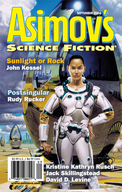
| Editor: | Sheila Williams |
| Issue: | Volume 30, No. 9 |
| ISSN: | 1065-2698 |
| Pages: | 144 |
The non-fiction highlight of this issue is an interesting essay by Kristine Kathryn Rusch on popularity, mass appeal, media SF, and Star Wars. Rusch has been one of the most reliably appealing short-fiction authors (I've not read one of her novels). Her take on the importance and merits of media SF and her defense of denegrated genres in general is provocative and worth thinking about, although I agree less with her concern for good escapism and happy endings. I think she has a good point about people wanting good stories more than perfect technology, and a good point about the degree of navel-gazing that science fiction sinks into, but I'm happy I can read novels with ambiguous endings and more complex goals than simple escapism. On the other hand, I agree wholeheartedly that the denegration of media SF within SF fandom is rather excessive.
Other than that, this issue was about average when it comes to columns. Paul di Filippo has a nicely extended book review column this month, but it's mostly anthologies, collections, comics, and non-fiction rather than novels. Still interesting, but not as interesting.
The stories, unfortunately, are a disappointment.
"Sunlight or Rock" by John Kessel: I don't get this story. Either I missed some overall thematic principle or there simply isn't much to it. It's about an out-of-work man in a run-down future colony who is about to get thrown out of his apartment unless he can find some money, a gambling scheme, and a bit of world background that isn't completely uninteresting but that doesn't have a lot to do with the story. There's a lot of alienation, a strong sense of isolation of the main character from his surroundings, and some good coverage of what it's like to be poor, but the plot never goes anywhere and the ending is quite unsatisfying. (4)
"Girl in the Empty Apartment" by Jack Skillingstead: The best part of this story is the main character's habit of assigning tags to the people he meets. It is, to an extent, a story about someone struggling with past trauma and trying to reconnect and care about the world. The background sneaks up on you because it's often not clear if strange things are happening or if the viewpoint character is just mentally disturbed. By the end of the story, it feels like a combination of both. I didn't really buy the metaphysical explanation, but that doesn't matter for the psychological impact. (6)
"Primates" by David D. Levine: A combination of a Bigfoot hunt and a Steven King story of an obsessive, this story struck me as dark, repulsive, and just not enjoyable to read. A biologist is taken captive by a sort of poor mountain man and made to search for Bigfoot. He's chained up, threatened, has to pick his way around the man's neuroses, the standard psychological horror bit. Crossed with that is a simple and somewhat conflicting story of preserving nature against intrusion, and the two halves didn't fit together for me. Not badly written, but ugh. (4)
"Godburned" by Karen Jordan Allen: This is an intriguing story about Aztec belief, the afterlife, and the experience of visiting temples. It reminded me of "Feather and Ring" by Ruth Nestvold, although darker and (to me) less appealing. A retired woman finally makes it back to Mexico, where she'd been previously only on her honeymoon, and ponders the Aztec belief system and how they could sacrifice their children while exploring the ruins. An interesting piece for philosophical pondering whose best point is the ending, where she chooses a direction rather different than what one would normally see in this sort of story. (6)
"We Are the Cat" by Carl Frederick: Three physicists and amateur cavers are caught in a cave-in and try to find their way out, meanwhile discussing the nature of observation and reality and how they're entangled. The story is a bit too long for its premise; I saw the resolution coming from some distance off and was just waiting for Frederick to get there. Otherwise, not a bad idea story. (6)
"Silence in Florence" by Ian Creasey: I like the idea: write a story about the servant class in the middle ages, who get very little attention unless they're about to become some great lord or power. It's also amusing to try to figure out just what the masked people are who the servant encounters. Other than that, a predictable story whose outcome takes one of the paths you'd guess it might from the start. Okay, but unmemorable; I think the premise is still available for another, stronger story. (5)
"Post-Singular" by Rudy Rucker: Well, it's not saying a lot, but I enjoyed this story more than anything else I've read by Rucker. It still has a flippant attitude towards both characters and world-building, barely a skeletal plot, and characters who rarely act like people, but here at least they occasionally pull themselves together and manage some approximation of human emotion for a page or two. Then the "story" feeling collapses and we're back to more infodumping or tossing about of shiny ideas (most of which I find much less shiny than Rucker does). Nanotechnology and alternate planes of reality that can be unlocked through mathematics are not so fascinating to me that they can carry a story otherwise peopled by stereotypes and weird, emotionally-dysfunctional robots. Odd, like all Rucker, and probably appealing more to people who love surrealism. (5)
Reviewed: 2006-12-11